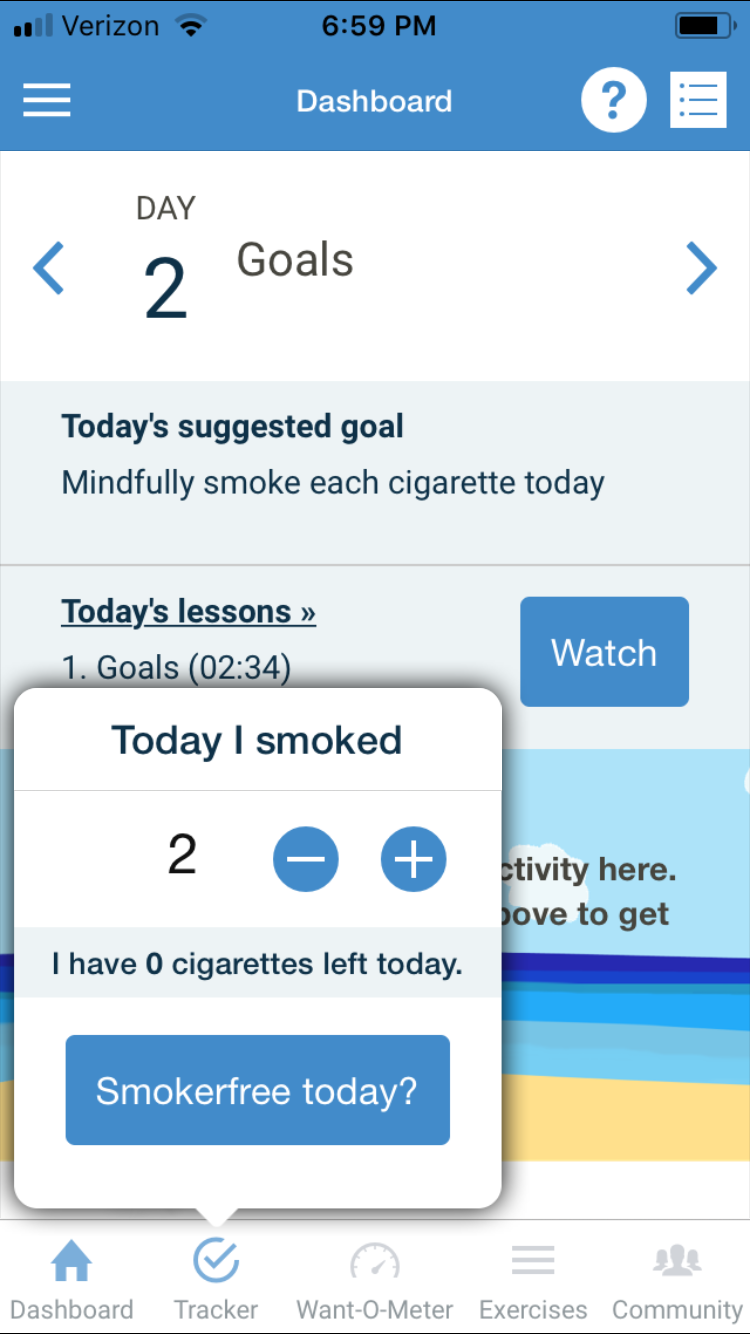 |
|
|
“Craving to Quit,” an app-based behavioral intervention, uses progressive videos, animations and in-the-moment exercises to help individuals quit smoking. |
The Center for Tobacco Treatment Research and Training at UMass Medical School has been awarded $1 million from a major tobacco settlement to bring its proven training and research programs to Massachusetts communities with higher-than-average adult smoking rates. The initiative will target communities identified as priority areas for tobacco control efforts by the Massachusetts Department of Public Health.
“This settlement provides us with the unique opportunity to ensure that those in Massachusetts with the greatest need and the least access to tobacco treatment services have access to proven tobacco treatment,” said Lori Pbert, PhD, professor of medicine in the Division of Preventive & Behavioral Medicine and founder and director of the Center for Tobacco Treatment Research and Training. “We will use the funds to provide training and support to the health care providers who are serving the tobacco users in these high-risk, high-need communities.”
The award will support scholarships and statewide conferences for health care providers who serve high-risk, priority populations in communities that have limited resources to take part in educational and skill building programs. The scholarships and conferences will build their capacity to treat tobacco dependence among the most vulnerable tobacco-using populations in Massachusetts.
Trainees will be qualified to bill MassHealth for services provided, thereby providing their agencies with the ability to bring in revenue to sustain the integration of tobacco treatment efforts. Training may also qualify individuals to apply for the new National Certificate in Tobacco Treatment Practice, thereby enhancing their career opportunities.
The settlement will also fund research to test how best to help smokers try and effectively use a proven digital therapeutic intervention, and then help keep them engaged until they stop smoking.
“Even when you have an effective app available, people don’t necessarily use it,” said Pbert. “And once we engage them in using a tool such as an app, how do we support them in completing the program?”
The study will be led by addiction psychiatrist and mindfulness training expert Judson Brewer, MD, PhD. Dr. Brewer, associate professor of medicine and director of research at the UMMS Center for Mindfulness, developed the app-based behavioral intervention “Craving to Quit,” which uses progressive videos, animations and in-the-moment exercises to help individuals quit smoking.
“We’re really excited to test the next generation of smoking cessation tools, and the best ways to support individuals engaging with and using them,” said Brewer.
The Boston law firm Shapiro Haber & Urmy, LLP, brought the class action lawsuit against Philip Morris USA, Inc. on behalf of smokers who purchased Marlboro Lights cigarettes in Massachusetts. When the court found that the health reassurance claims made by Philip Morris about Marlboro Lights constituted willful violations of the Massachusetts consumer protection laws, the firm recommended UMass Medical School be awarded a portion of the residual settlement funds because of its proven track record in training, public service and research to help tobacco users stop smoking.
Related stories on UMassMedNow:
Study: School nurses help teens to quit smoking
First-of-its-kind tobacco treatment training program launched
Brewer on WBUR: Mindfulness helps smokers quit
New paper in Pediatrics by UMMS professor helps pediatricians reduce youth tobacco use
New book by Judson Brewer explores mindfulness in overcoming addiction